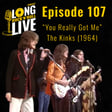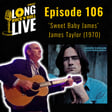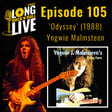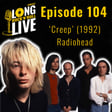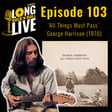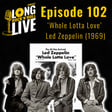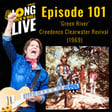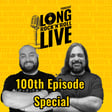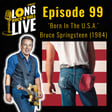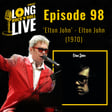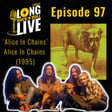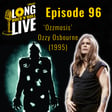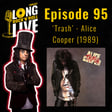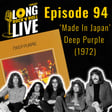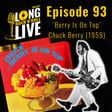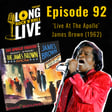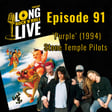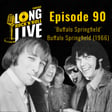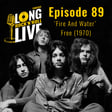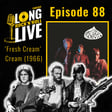Introduction and Background of The Who
00:00:12
Speaker
Hello and welcome back to the Long Live Rock and Roll Podcast with your host, Lazmic Alides, and on the screen over there, Mr. Felipe Amorim. How you doing, bro? Doing great, brother. And you? Good. Yeah, very well. Thank you very well. I'm really looking forward to doing this episode, I have to say.
00:00:26
Speaker
And if you can't tell guys from the visuals behind us, we are doing an album that I chose this time, and the album is Who's Next by The Who. Now, I'll just tell you a little bit about why I chose this album first. Now, myself and Felipe, we've had numerous discussions, haven't we, about bands like The Beatles, because we both love The Beatles. The gentleman we were playing and touring with, he loved The Rolling Stones, so we often talked about The Rolling Stones.
00:00:52
Speaker
But one band that always lumped in with The Beatles and the Stones are The Who. And I thought it was about time we looked at The Who.
00:01:01
Speaker
So a bit of info about the album. This is their fifth album. It's called Who's Next. It was released on the 2nd of August, 1971, recorded between April and June of 1971. The genre is considered to be hard rock, which I think is pretty fair. Clocks in at 43 and a half minutes. The label was Track and Decker.
Personal Reflections on Discovering The Who
00:01:20
Speaker
The producer was Glyn Johns and The Who, and the singles from the album were Won't Get Fooled Again, Baba O'Reilly, and Behind Blue Eyes.
00:01:28
Speaker
Now, I want to start off by telling you guys, including yourself, Lee Paver, I've had this little, what's the word, this little stick about the who for a long, long time. Right. The first thing to say is that I've never really given them enough of a chance. The songs I've heard are the singles and the hits and I've heard them. I've been like, yeah, they're fine. But I've never understood.
00:01:57
Speaker
why they were put in with the Beatles, the Stones, the Kinks, if you like, as being one of those pioneering, important bands of the 60s. Spoiler alert, my opinion has changed since doing this album. But I just wanted to open with that to tell you where I was on The Who. Now, we haven't discussed The Who much for Lee Pei. What's your opinion on them?
00:02:24
Speaker
I love them. I mean, you really, yeah, I know it's funny. They kind of came later in my life, which is funny because by the time someone mentioned the who to me, believe me or not, I have I had been through the whole Black Sabbath discography, the whole Zeppelin and Pink Floyd discographies. I'm literally I've listened to all of that from those guys and the Beatles and all the Stones classic albums.
00:02:52
Speaker
And then someone mentioned The Who, and I was like, yeah, I think I've heard of them. And I don't know why it took that long. And then I was already playing gigs professionally, and a friend of mine bought, I think, one or two DVDs. And those are all after 2000. So that's The Who with Zach Starkey on drums, who is Ringo Starr's son, who's one of the
00:03:17
Speaker
for me, one of the greatest rock drummers out there. But that's a different incarnation of the band. You know, you only have half of the original lineup, so we have Pitch Downs and Roger Daltrey.
The Who's Live Performances and Legacy
00:03:31
Speaker
Who's on bass for them, do you know? Well, the first DVD I've watched was still John Entwistle, and then he died a few years after that. So the other DVD I had was probably 2000 and
00:03:43
Speaker
10 or something like that and it was with Pino Paladino on bass. Oh of course, we are one of my favorite bass players. Yeah so the recent lineups they played with like those guys are all like session musicians you know.
00:03:58
Speaker
freelance musicians, hired guns as we normally call them, but they're phenomenal and they always worked with great musicians. So The Who for the last three decades, they have been about more than that, they've been basically Pete Townsend and Roger Daltry plus
00:04:20
Speaker
you know, assorted, great session musicians, you know, depending on the tour, although they managed to keep Zach Starkey for most of that time now. But still, they are really energetic live. And I think every time they play up to this day, they are a phenomenal live band. So I got to know them by watching videos of them
00:04:45
Speaker
older playing the classics and I fell in love with those songs by the live version of it, the interpretation of it and then I started listening to the albums and it's funny because we decide on which albums we're going to do for the podcast and this probably has been decided long ago so I didn't remember who chose the album but this album is one of my favorites. I think it's amazing.
00:05:11
Speaker
That's good. I decided to do it because of my own little issue. Yeah. Yeah. I've said it already. I feel like, um, I needed to give them a go because I was just, I always kind of like, ah, so who, you know, really are they that good? Um, as I said, five minutes ago, spoiler alert, this album has changed my opinion on them. Um, I don't even really know where to start. I think, I think what I will start with is.
00:05:42
Speaker
how hard this album rocks. Excuse the cheesiness and the pun in the line, but this is a genre defining hard rock album, isn't it? And I think the majority of that comes
Pete Townshend's Vision and 'Who's Next' Creation
00:05:56
Speaker
from the performances. And it's hard to believe that The Who would still be a good live band in this day and age without John Entwistle and Keith Moon, because they made up so much of that hard rock
00:06:09
Speaker
intense, live, energy part of the band, didn't they? They literally made up half of it. They were the rhythm section. So to hear that Zach Starkey and Pino Paladino are doing a good job is really nice to hear. But yeah, I mean, where do you want to start with the album? Did you have anything you want to kick off with? Yeah, I actually want to start by kind of
00:06:34
Speaker
reflecting on where they were in their careers. This is the fifth album. Very often we have these bands, we've discussed a few bands that
00:06:49
Speaker
sometimes make their best work not right at the beginning as some people tend to think you know the first three albums are the best well not really always the case but here's the point they released Live at Leeds which is one of the most incredible live albums very famous isn't it yeah of you know in rock history again it's this phenomenal album and they had
00:07:16
Speaker
So they prove they're a great live band. That's a point in their career where everyone respects them as a phenomenal live act. And they've done the opera rock stuff or concept albums, whatever you want to call them.
00:07:32
Speaker
that it told me, right? What else? Was it quandrofino? I feel like that came after, I haven't looked. They definitely did tell me before that. Well on Tommy, I've listened to an interview today where Pete Townsend was saying that they knew that they were kind of going more in the direction of the harder side of rock in the 60s
00:08:00
Speaker
So whilst The Beatles, The Stones and The Who were kind of pushing this pop thing, he wanted to keep those fans, but at the same time he knew that the hippie movement was going on in America. So he wanted to get them both in, which is why he wrote Tommy as like a mystical concept album that had an element of psychedelia to it, but also sort of satisfied the pop audiences. So he did that, didn't he? Do you want to take it from there?
00:08:24
Speaker
Yeah exactly and in Tommy you have all those songs connected somehow telling one story starts to finish isn't it? So it's like you have different songs but you have a storyline that connects them all and you know Tommy being the central character of the story so they wanted to do it again
00:08:46
Speaker
So that's the point. You know that Pete Townsend was working in another opera rock album, or if you want to call it a concept album, which was meant to be called Lighthouse. So he had a few songs apparently. I don't know how many of these songs were initially written for that, but definitely Babo O'Reilly. So that was a song that he was writing for that
00:09:16
Speaker
project. So apparently they didn't get the sponsorship they wanted, maybe their labour wouldn't fund another opera. Can I expand on that because I've done a lot of research on that. So he did, he had the he had the life house, which was going to be not not a sequel to Tommy, but another rock opera. And what happened is there was a few things initially, and I think on the mainstream websites, what you read is that there was a schedule clash with the manager with the managers.
00:09:46
Speaker
Just to answer your question, a lot of the songs from Lighthouse were on Who's Next and whatever didn't go on to Who's Next are scattered through the other albums. He probably used them all. Yeah, yeah. But I was just watching the classic albums episode of Who's Next and it's fascinating because
00:10:06
Speaker
Pete Townsend was saying that he was very much going in the same vibe as he was going for for Tommy creating this rock opera with all the songs interlinked and with a general theme of
Musical Innovations in 'Baba O'Riley'
00:10:18
Speaker
Becoming your own person. There was what they called the mod movement going on in Britain at that time, during the 50s, it kind of expanded. The mod stands for modernist, and it was about just taking a hold of yourself as a person. Be yourself. Don't do what the establishment wants. Don't do what your parents want to do. You grab a hold of your life and do it. And we're going to see some of these themes come up in some of the lyrics of these songs.
00:10:48
Speaker
As for the writing of it, Pete got stuck and the whole band and the management were behind him trying to do this life house opera. They were really up for it. But I'm just, yeah, the rest of the band didn't really get it. They didn't get the idea he was going for, but they were there for it. They said, Pete will support you, we'll do it. It just didn't, you know, it was much bigger than just an album. I don't know if you know this. He wanted to make a movie.
00:11:18
Speaker
And he wanted to make a movie that was interspersed with a concert and mix things together and have sections of a concert going in with the movie and this, that, you know, just, you know, it was, it was a big thing, but it didn't get there. It didn't get there. It fell off and maybe things like those schedule clashes with the manager sort of came into play and they all just kind of said, you know what, this isn't really going to work. But as you said, we were left with songs that they then took to a studio and turned into who's next.
00:11:45
Speaker
which is for me I'm glad that that's what that's what ended up happening because instead of having another concept album which they already proved they're good at yeah they came up with a great collection of rock songs and I'll say just that they are rock songs to me they're not have that heavy but they're not
00:12:09
Speaker
just like the sing-along stuff they did, like the early stuff like My Generation, Can't Explain, those songs, they could even be featured in the Beatles album, you know, short, straight to the point, you know, loads of choruses, you can just sing along, and this time they will
00:12:26
Speaker
I think they found that point, that sweet spot between going really creative and still being able to deliver popular songs. Yeah. Let's get into the album. But just before we do, I want to tell two quotes from Chris Stamp, the manager, and Pete Townsend. And it just dawned on me that I have
00:12:52
Speaker
Listen to this album and I've got it. I've understood it. I get why it's so good. The world gets why it's so good. Everyone gets why it's so good. But listen to these quotes from them. From Chris Stamp, the manager. It wasn't as fantastic as it was meant to be. And Pete Townshend said, who's next felt like the one that got away
00:13:13
Speaker
He really wanted Lighthouse to work. From the interviews I watched, he put so much of his soul and his heart and his energy and his talent into Lighthouse that I can tell from the interview, I think he still feels a little bitter that Lighthouse didn't work off. Not bitter towards anyone, just sad that it didn't materialize. But I thought, my God, how many people
00:13:37
Speaker
write what some people call one of the greatest rock albums ever and say yeah felt like it got away just a thought just something to think about yeah let's let's go straight in with Bubbo writing one of the most famous rock songs ever right not just in the 70s and I think the the most important thing is how recognizable the intro is isn't it and this is a key factor of the album
00:14:01
Speaker
is this introduction of synthesizers into rock music. Now what's important about the two main synthesizing parts on this album which is Bubba O'Reilly and Won't Get Fooled Again is that the synthesizers are not there just to play an effect or to play along with the chorus, they're setting the rhythm.
00:14:22
Speaker
Aren't they? They're setting the tempo. It's like a sample, right? That's a sample. We hear Pink Floyd using it. A lot in modern music. And Pink Floyd used it a couple of years later in one of the songs on Dark Side of the Moon. But yeah, what an intro. Talk to us about that.
00:14:35
Speaker
I love the intro because they really bring in the synth sound into the band. That's the risky part of it. You're a four-piece band. None of you is a keyboard player. And then you say, yeah, the main instrument in this song is going to be a synth and you're going to have that loop that goes on and on and on and on. And I find it beautiful because you have the synth and then the piano
00:14:58
Speaker
and then you start, you have the groove. It's like the guitar, it takes ages and ages for the guitar to just, you know, join the band. And if you see some of the live performances of that song at the time, they had some headphones because they want, I think, I don't know if it was a playback of that synth or they didn't have a keyboard play on stage. And I just, I don't know, but you can see them with headphones probably with
00:15:22
Speaker
an early version of a live click track. I don't know what they were doing, but it's the only song that you'll see them playing live with headphones so they can listen to the loop, probably, playing over the loop. It's an iconic intro. It might be one of the most famous intros in rock music, and it's not played on guitar. Yeah, there you go.
00:15:48
Speaker
I think, as I always say, less is more, and I love it here, because if you listen to the verses of Baba O'Reilly, they're so simple. It's just some power chords, isn't it? Dan, Dan, Dan. But then he could do the whole, you know. Yeah, with his, yeah, that's it with the whole Flying Arm and everything. It's just a really, really good song. And I don't think that does it justice enough. It's a good song. It's just fantastic. And what a way to kick off an album.
00:16:16
Speaker
Yeah, yeah. There's a video of them playing at the Super Bowl. So they're one of the... What year was that? Oh, 2012, something like that. I don't know. Check it out. I'm glad we got Google to help us with those things. We don't need to memorize dates anymore. So The Who Live at Super Bowl. They basically played a medley of all the hit songs. So they've played
00:16:45
Speaker
they played without stopping just one song into another and just parts of the songs so because it has to be like a 15-minute performance isn't it? 2010. Yeah almost got it. So I recommend everyone to listen to that to watch that performance. So the thing is you have the whole stadium singing along when they go
00:17:05
Speaker
into that part, you know, Teenage Wasteland. So you just, you just, you can hear everyone singing along. And that's how powerful that song is. And again, the lyrics are very simple, in a good way, you know, delivers the message straight away and- Teenage Rebellion, isolation, the search of
Themes of Rebellion and Individuality in 'Who's Next'
00:17:25
Speaker
meaning in a life, you know. Well, you said at the beginning, it makes a lot of sense to me now, like, you know, looking for your own self, you're not trying to
00:17:32
Speaker
to be someone else, isn't it? The whole, yeah. It feels to me like the album starts and finishes with that message. Definitely, yeah. But this is what I wanted to convey with the Life House thing, is that he was working on a rock opera that was, wow, you know, I'm gonna remember it. He wanted a, he wanted to create a character that was deaf, dumb and blind,
00:17:58
Speaker
but also in the future. No, no, no, no. He wanted to do it again. He wanted to do it again, but he didn't know how to do it. So what he did for Life House was that he was going to send the character to the future.
00:18:13
Speaker
and put him in a suit and give him a corporate job because he thought that is the meaning of being deaf, dumb and blind, doing everything your company tells you, living by the standards your parents set, stuff like that. So my point is I just wanted to convey that the Lighthouse message has strongly gone into these albums, which is why it's important to get a bit of that context from before, because we're still seeing the lyrical themes here, aren't we?
00:18:38
Speaker
teenage wasteland, capturing the disillusionment of youth culture and
00:18:46
Speaker
painting pictures of individual struggles and trying to find meaning in life, connection, you know. But yeah, what a way to kick off. And we're watching the violin solo at the end. Again, another completely unrocked rock and roll thing, isn't it? And they get into like this near drum groove, which feels almost like country music. It's a bit poker. Yeah, a bit poker.
00:19:09
Speaker
Yeah, exactly, they go into that vibe, it's very traditional. So again, I think they were playing whatever they wanted to play, so let's put a violin solo at the end. The title of the song is based on two names, isn't it? It's an Indian guru who was an inspiration for Townsend, also a classical composer, so you probably got their names there, right?
00:19:33
Speaker
Well, the Indian Guru is called Baba something and the composer. I don't know. Yeah. And the surname of the classical guy was Riley. So Terry Riley. Terry Riley. So you have a classical composer and an Indian Guru. So basically, again, see how interesting it is. Find your own self. He is talking about
00:19:57
Speaker
religious philosophy kind of stuff and classical music they're not like related so what you know he so he like he is like he has his his personal um journey and his musical journey and the combination of that is bambo riley that's how i feel about it
00:20:16
Speaker
Do you know what, I think it's probably actually a good idea to go straight to the last song, won't get fooled again because I feel they're very similar in tone and vibe and attitude. Man, I just, I thought of this on my way home today because I was listening to them for the third time in a week and I was like,
00:20:33
Speaker
I've finished the album and started again. So I've listened to this. I listened to the whole album, Pullers, Babo Riley, again. And I was like, oh, it works. It makes a lot of sense. Because again, so they repeated the formula with One Get Fooled Again. Yeah. The start, the power chords. If I mentioned the who, you've got to talk about this song. I think it's one of their anthems, isn't it? It's a proper, like, classic song.
00:21:01
Speaker
It does have the same formula. So you have a synth and a piano together and then, you know, have all the, and you get into the heavy drumming, you know, and you have parts when you stop and change the singer, etc, etc. So they use the same formula, but it's a very, very different song.
00:21:20
Speaker
Yeah, very much longer as well in the stays in the same group. Yeah, but it goes deeper into the message. So Walt on the first song is more like, you know, I'm here just fighting for my own survival, gonna do my own thing, live my own life. The second one's got more sarcasm. So the last song of the album won't get fooled again. It's got more sarcasm. And when it comes to the political side of finding yourself, isn't it? Because it is basically telling everyone
00:21:49
Speaker
uh if you you probably have a lot to say about this i would just say what i what i got from from it it's like you're going to support a revolution today you know uh because you believe that the people with the microphone are the ones who are gonna um call everyone for action and change the country or change whatever and then those people are going to become the new leaders
00:22:12
Speaker
are they going to do the same things as the old leader? So that's why in the end the very last line of the song is meet the new boss, the same as the old boss.
00:22:22
Speaker
and yeah but yeah I'm sorry the personal side of that is which uh my favorite line is and I'll pick my guitar and play just like yesterday because it's like yeah we've been through the revolution is that same old shit over and over again yeah uh we're not gonna get anywhere but I'll just do what I what I know I'm just gonna do my thing I'll go and play my guitar yeah
00:22:46
Speaker
Yeah, I know everything you said is completely agree with it. The only thing I wanted to say is that Pete Townsend actually had this to say about the song. I'm paraphrasing here, alright? So this is the exact quote because I was trying to type as I was watching Jimmy. He said,
00:23:01
Speaker
won't get fooled again he said it's not a defying statement but a plea please don't make me the new boss even though i might be your hero on stage don't make him meet the new boss as i'm no different to the guy who was on stage before me be yourselves find your own journey make your own path
00:23:21
Speaker
those last three sentences I added in. It's such a note kind of a message that people probably never paid enough attention to. I was going to say it's hard. When you're in a position of authority like Pete Townsend is in the band, he was primary songwriter, wasn't he?
00:23:44
Speaker
I sometimes think it's hard to, when they're singing lyrics about, you know, don't idolize politicians, don't trust your government, it almost feels a little
00:24:00
Speaker
hypocritical because you're saying, okay, don't trust these people, but trust me. But in these lyrics, Pete Townes is explicitly saying, don't even trust me. Just be yourself. Like do everything for yourself. Which is what he was doing in the previous years with my generation. People tried to put us down talking about
Drumming Styles: Keith Moon vs. John Bonham
00:24:21
Speaker
my generation. It's always the who's message. And I've only got this from this album and an interview or what the TV show seems to be.
00:24:30
Speaker
It's not like rebel, fight your elders, don't show them respect. It's just about be individuals, be yourselves. Yeah, exactly. And I think it's a powerful message. And if you're actually capable of thinking like that, then if you want to follow a leader, but if as long as you can question the leader, maybe that wouldn't make sense. But what he's doing, what is yeah, what he's doing there is like, literally says in the song, like, you know, the other
00:24:58
Speaker
the left and the right are the same on their point of view. So the conflicting parts, the parts are struggling for power, you know, in the end of the day, are you going to choose a leader and just obey and then you think that leader is different from the previous one? Well, guess what? They're not. So I think that's rock and roll, you know, that
00:25:17
Speaker
they are telling someone that like you know what you can be free you can think for yourself you can fight for your own survival your own ideals your own you know life you know it's cool i love it and i think it's very cool yeah and they do it in a powerful way with a you know with loud guitar drums and and bass and it's all the same shouting when necessary yeah it's all the same as the first song isn't it the also you know significant use of power chords
00:25:46
Speaker
the awesome drum fills. I mean, I know he came first, but because I'm more of a Zeppelin fan, I can't help but feel that Bonham took some inspiration from Keith Moon, right, in the sense of just absolutely going to town on the toms. Well, they knew each other, you know. I didn't know that. Well, there's a story. I don't know. I don't know if this is actually
00:26:08
Speaker
the truth, because there's so many versions of this, but some people say that Keith Moon came up with the name Led Zeppelin. So that's one of... I don't think that is true, but I've heard that story already. Yeah, I don't think it's true. It's a myth, but the fact behind this myth is that they actually used to hang out together. That's really cool.
00:26:28
Speaker
Can I ask you something as a drummer? To me it seems like their style is very similar, it just feels like hell for leather, pound it as hard as you can, obviously good timekeeping and everything, but would you say they're quite similar as a drummer or do you notice discernible differences?
00:26:48
Speaker
Oh man, I could talk about the difference for an hour, but there's the similarities. Keep it to two minutes. Similarities between Bonham and Keith Moon, I'd say it's like they can be really aggressive when necessary.
00:27:04
Speaker
keep the beat when they need to. But the thing with Keith Moon, I think that his playing is beazier in a certain way. It's like every other bar, there's a drum fill, whilst Bonham would stick to the groove for much longer, he would play less fills than Keith Moon. Maybe Bonham was a bit more funky. Groovy.
00:27:29
Speaker
more groove. No, I was gonna say, sorry, Bonham a bit more groovy. More groovy, yes. He flew a bit more straight. But yes, and more towards the rock side of drumming. So I think it's more like it's pure rock and roll, it's loud, loads of fills. And the freedom that he had behind the drum kit
00:27:53
Speaker
Some people would say he was just doing whatever, he would play it in a completely random way, but to keep the groove together or the rhythm together, at the same time being that creative and completely mad behind the drum kit,
00:28:09
Speaker
It's not an easy task and I think not many drummers could do that to the level he did. So that's why he changed the history of drums. That's why you have drummers from different styles recognizing how good he was. So it's not like
00:28:28
Speaker
If you appreciate drumming, you've got to listen to Keith Moon at some point and give it a
Innovative Bass and Vocal Excellence
00:28:35
Speaker
go. I think one more thing about him and this album, I think he dedicated more time to Groove rather than just showing off his fills. I think there's more Groove, in my opinion, in this album. I feel like that's the same for every member in this album, to be honest. But we can get there. June, say anything. Where do you want to go next?
00:28:57
Speaker
uh who's next yeah come on brilliant yeah i'll say who's next uh yeah we're talking about one but we talk about two members of the band right they talk about beat downside as as the main song right and keith moon as they talk about the others yeah let's let's talk about what do you think about john n whistle there we go that's where i mean john n whistle i mean in many ways you could say he was a pioneer in rock bass playing because you have to think when the who began
00:29:27
Speaker
And by the way guys, any songs we mention are going to be in the show notes in the playlist below. When The Who began, which I think was mid 60s, you know, my generation came out in 1965, I'm trying to think what the norm was at that time and the norm for bass players was to
00:29:48
Speaker
sit on the root note. I know Paul McCartney was doing some cool things with the Beatles, experimenting a little bit, but the typical bass players thing was to sit on the root note, maybe you go root and fifth. You know, very boring. It was just to marry up the relationship between the rhythms in the drums and the harmony in the guitar. But what people like John Entwistle did is they aligned the bass more towards the guitar
00:30:16
Speaker
Would you agree, they kind of turned it into an instrument as important as the guitar because often you think about heavy metal music thing about rock music you have the guitar and the bass doing the same thing from Zeppelin all the way through to like, I don't know bloody.
00:30:30
Speaker
metal band, you know, Trivium, whatever, that you have them doing the same, they're playing the same kind of thing, whereas before a guitar would do the riff and the bass would just sit on it, maybe even on a different rhythm playing. Yeah, I have a feeling that with the Who there's some, there is, there's a lot of parts of that song where Townsend just
00:30:51
Speaker
gives room for Antoine Sulte to just do his sync. It's like you hear last guitar or the guitar is doing more rhythm than riffs. So the bass can show off in a certain way. It's like you have rhythm guitar and lead bass. The best example though is the song My Generation because he's got the bass solo in and that to me properly signified. Not only that the tone and I was actually in the interview as well as I was listening and
00:31:21
Speaker
Pete Townsend was saying that they actually took inspiration from John Paul Jones from Led Zeppelin. Because when John Paul Jones was playing session bass before he joined Led Zeppelin, he used, I mean, John Paul Jones was mainly a finger player, but he did for some sessions use a pick. And he got this tone out of his bass that actually inspired John Entwistle to create his own kind of tone similar to that, which I thought was kind of interesting. But yeah, when you think John Entwistle, you think that massive
00:31:49
Speaker
powerful, powerful, thumping, ferocious bass. And he played it often with his fingers. And you watch him do the My Generation bass solo. It's like, do, do, do, do, do, do. And I just remember hearing that for the first time and thinking of that bass tone and being like, shit. That is furious. That is furious. That's a word that really describes him. And he is a rare case of a bassist that would play a different line at like every bar.
00:32:19
Speaker
and still grooving. I think this is really not the case. It really normally does work, which is the more notes he plays, the better his sound.
00:32:34
Speaker
It's just, it's insane how he manages to do that. It's like the perfect choices on every bow. Well, I just wanted to talk about the song Getting in Tune because for me, I've got written here, Entwistle's best moment. And I'm thinking, you know, I always say, less is more, and you don't want to overplay.
00:32:52
Speaker
There's a moment where, you know, it's a very slow ballad song. I'm getting in tune. And then there's one part where Empt Whistle, he goes, I'm getting in tune. Kind of finding the key, right? But it feels like normally if I heard that, I'd kind of be like, oh, you're overplaying a little bit. You know, there's no need for that many notes in a song this slow.
00:33:16
Speaker
But with Emwistle, he just works in, man. He just works in and he makes it fit seamlessly because he doesn't overdo it. He'll do little, little flashy bits like that and they'll, and it will work because it will just take you by surprise and it'll only be once. You won't do it again. And it's just like little moments of brilliance that take you by surprise.
00:33:32
Speaker
Yeah, another moment he does that, he does some cool grooves behind blue eyes, because what happens with that song is the drums only come at the end. And so you have this really, really strong vocals at the beginning with acoustic guitar. It's guitar vocals, guitar vocals. You go into the chorus and you think, well, as an arranger, most producers would think, well, you know what, let's just add drums from the chorus.
00:34:01
Speaker
But no, what comes into the chorus is the bass giving more life to the song. Just the bass was enough there. Just fattening it up a bit. Yeah, lovely. Great stuff. So we've done it with song. We've got to talk about Poultry Man. Oh, what a singer. I had the pleasure to watch him live at the Palladium in London. Oh really? Brilliant. What was that man's own band?
00:34:23
Speaker
He was, yeah, his own band. Has he done a kind of Robert Plant thing where he's made his own music? Do you know our friend, the harmonica player Tom Brumditch? Of course I do. Yeah, you know, he played with us a few times with Jack Hutchinson. And Tom gave me a ticket for that gig, so I went to see him. So obviously he did his solo stuff, did loads of the who stuff, but I was really, really impressed by the quality of his vocals, you know, up to this day. You can tell he looks after himself, doesn't he?
00:34:52
Speaker
Yeah, he's healthy. He looks after himself and he sings. And the thing is, you can see he's a technical singer. He knows exactly what he's doing, he's breathing correctly and he looks after his health and other stuff. But there's so much passion. And if you consider that with the who, he was singing mainly lyrics written by someone else.
00:35:17
Speaker
So to interpret someone else's lyrics, putting your heart into it and make it sound maybe better than it would sound in the voice of the songwriter because Townsend himself is a really good singer and I love all the parts he sings and his voice is so clean and I think
00:35:42
Speaker
Yeah, he's got a beautiful voice, but Daltry is just like a punch in your face when he sings, isn't it? But at the same time, Daltry can sing beautifully and softly, can't he? Just like in Behind Blue Eyes and getting in tune, I think those two songs. As good as his scream is, at the end of Won't Get Fooled Again, it is iconic and it's rock and roll, but for me,
00:36:11
Speaker
For me, the screen is made better because you hear how he can sing softly. I always like that. If all you can do is scream, it's like, cool, that's good. But show me what else you can do. And Daltrey on this album, my God, his vocal range just from soft, sweet, really passionate all the way up to the screen is just fantastic.
00:36:30
Speaker
Well, what I can get from him is he really enjoys being a singer. He enjoys being on stage and performing. Just look at that photo behind you with the screen and the mic cable. When I was watching this, instead of just listening, there's him having a lot of fun on stage. Yeah.
00:36:51
Speaker
Brilliant stuff. Any particular songs you want to talk over? I feel like we've actually touched a little bit on each one, but is there any defining factors? Actually, I have a question for you. I have my own answers to this, but I have a question. Which song was a surprise for you? Oh, that's a really great question, and I actually have an answer.
00:37:13
Speaker
For me, the song is over, is my answer to that. And I'll tell you, can I talk about it for a bit? First of all, it's six minutes long, just over, and I'm never bored during it. I think, what a bloody good song. Now, Townsend's vocals, he's the lead vocalist for most of the song. Now, what screams out to me, especially in this kind of music, which is meant to be, let's call it accessible hard rock, yeah?
00:37:42
Speaker
Yeah. Key changes. One minute 45, there's a key change. Two minutes 35, there's another key change. And this really, really, really reminded me of a Beach Boys song called That's Not Me, where Brian, what's his name? Brian Wilson. It is, isn't it? Brian, yeah. Yeah. Do you remember when we did that episode, I got him confused with the Rolling Stones guy. Yeah. Brian Jones. That's it, yeah. Brian Wilson had this, Brian Wilson was a composer.
00:38:12
Speaker
and he wrote music almost as if it was classical music and we know through, I know through many classical composers that you always change key in classical music because you're changing the section whereas in pop music you'd go to a verse, in classical music you might change key to take you to a new section. I'm generalizing here but that's the idea.
00:38:36
Speaker
I never gave Townsend the credit that I think he deserves now. I always thought he was just a rock guitarist who put some songs together, but listening to the song is over. I can hear he really thought about the song and which direction to take it in. Okay, why change the key here?
00:38:52
Speaker
And why do it again at 235? It tells me that there's more than a rock guitarist behind these songs. There is a writer, there is a composer, there is a musician. And it really took me by surprise. And it's a sad song as well. The lyrics, exploring the themes of loss, acceptance, passing time, realisation that all good things must come to an end.
00:39:18
Speaker
really surprised me. And that was the one that surprised me because I knew the album and I honestly didn't remember that song.
Diverse Influences and Album Significance
00:39:28
Speaker
It's like squeezed in there in the middle of the album with loads of classic tunes. And then when you listen to it, it's like, wow, it's beautiful, isn't it? All of it. It just took it to another level for me. Like I said, the first four songs
00:39:43
Speaker
Do you know, apart from Bubba O'Reilly, songs two, three, and four, they're fine, but I love the back half of the album. Yeah, I love when they change from one singer to another and they just change the whole arrangement behind it as well. They do that a lot. The contrast between their voices is one of the biggest things. That was my surprise. Do you have a personal favorite song?
00:40:13
Speaker
I need to give an honourable mention to Baba O'Reilly because it's one of those songs, like I said, don't repeat myself, I never got the who. So when I heard Baba O'Reilly before, I was like, I don't get this, it's not really doing it for me. Now I can listen back and say, fucking hell, that's a good song. So that deserves an honourable mention, but the song getting in tune
00:40:35
Speaker
I thought was really nice, very theatrical and extravagant. It almost had like, you know, I kind of think Queen probably listened to that song and when Freddie Mercury went, God, I could thrive doing this kind of music, you know, really, really vibrant. You know, like I said, what have I got here?
00:40:50
Speaker
It feels like a second part of the song is over. It is, yeah. It feels like Empt Whistle's best moment to me, that the song's journey is great too, taking us from that soft start to an exciting high tempo rock and roll end. So yeah, well what about yours, personal favourite? My favourite's mobile. Yeah, I do. That was great, everyone. I guess it's not pretentious and it's just like,
00:41:14
Speaker
So enjoyable, you know, you can picture this guy in a car. It's like driving. Yeah. Very country music vibes. I mean, a bit kind of Rolling Stones, the way they throw in a little bit of blues. Yeah, loads of acoustic guitar, which they were really good at that.
00:41:34
Speaker
Yeah. And and you have Keith Moon going nuts at the end of it. So it's like he's like he is waiting for for the end of the song to give it all. And I love it. I think it's a great song. And it's a good laugh. Same thing as My Wife is another song. You listen. It's just a good laugh. That's the only one who sings. Such a shame that the vocals are a bit berry in the mix. You can, you know, for some reason it's not as loud. But he does a great vocal performance and the lyrics are really funny.
00:42:01
Speaker
It is. Yeah, they are really funny. But I say what I like on that song is the saxophones or the trumpets really kind of gives it a kind of Motown feel. And as I say, always, I just love when you take little bits of other styles and plonk it into I mean, we said it with with Muse a couple of a couple of weeks ago, you know, it's just taking little elements of something but still keeping your own signature sound. And I think I don't know if this album
00:42:31
Speaker
defines the who's sound you can answer that in a second but but if it does I think wow they really deserve the credit they got because
00:42:45
Speaker
I'm not going to go down the route again where you know I always use the animals as an example because that's a great episode we did where you see a band obviously saying this is how the animals do R&B, this is how the animals do rock and roll, this is how the animals do blues, whereas other bands take little elements and mould it and say okay well we're going to do our version of rock but with little bits here and little bits of that.
00:43:08
Speaker
This, I couldn't even tell you a song. I couldn't even pick a song from these nine that I'd say that is the who's defining sound. Maybe Bubbo, Riley and won't get fooled again. That's the obvious answer. There's just too much going on in between those two songs. Behind Blue Eyes, such a classic as well. Yeah, but that's not Hard Rock, is it? I thought it was a ballad. But people would associate that as being one of the famous songs.
00:43:33
Speaker
again it's only a ballad until the drums come in so there's then something else so it's it's yeah i think for me this album defines uh what kind of band they were i'll tell you another story yeah can i ask you i just want to ask you if you had to pick one song from this album that defined the who for you what song would it be
00:43:58
Speaker
because I'm just telling you, I can't decide because I don't know the who well enough. Oh man, that's difficult. I mean, it might be a cliche to say, won't get fooled again, but let me go through the track list again. Oh man, difficult. I don't think I can choose one. Oh, do you know what? Bargain.
00:44:20
Speaker
That's it. Interesting. Very interesting. I didn't think you'd say that. Yeah, I just like it. There's a lot of their sound in that song. Dynamic guitar riffs, driving drums. It's a love song, but not a predictable kind of
00:44:37
Speaker
you know, choice of words on how to describe how you love someone. There you go. I don't know if anyone thought that would be the flea basil. There you go. They play this on live with such energy. It's so great to see you.
Album Cover Story and Conclusion
00:44:51
Speaker
You had a story you said.
00:44:52
Speaker
Now, a quick story about this gig of nature. So Roger Dautry is answering questions that he received by email, whatever. So he's got some cards with the questions in his hands. People ask him some questions all the time. So I'm going to give you my answers. And one of the questions, what's your favorite The Who album? And he said, oh, I can't really choose one. I love all of them. Who's next? He changed the cards.
00:45:19
Speaker
that was brilliant yeah so that for me was like okay so we we have a favorite album you know he's got a favorite album and it's my favorite album out of all the whole discography it does define who they are. Just to talk about a bit of significance culturally and musically about this album the first thing that we mentioned already was the innovation in the use of the synthesizer and the electronic effects you know when you consider 1971
00:45:50
Speaker
People were using synths, you know, the Beatles used synths towards the end as well. But as I said, providing a rhythm and a stability and a tempo to the song rather than just an effect over. Previous albums from The Who I've heard are quite thin and raw in production. Yet, my God, man, who's next sound like it could have been produced
00:46:18
Speaker
like not even you know 80s 90s sounds really good really good production isn't it yeah every instrument is perfect you don't even need to listen to a remastered version but just listen to the original mix and master it's great the only thing as you mentioned was uh m whistles vocals are a bit low in the mix on my wife but other than that couldn't tell you anything else that i had to complain about the mix wise it's fantastic
00:46:44
Speaker
Someone commented on it and called it, intelligent rock and roll that keeps the spirit and attitude but has a very mature sound and depth to it, which I thought was quite interesting. Intelligent rock and roll. It's like an oxymoron, isn't it? You wouldn't kind of put them together. Exactly. But it gets to a point when, for me, it's like, yeah, we're getting too clever. Let's just throw a song like My Wife on mobile in the bit of it. So don't take yourself too seriously.
00:47:12
Speaker
The other thing I want to talk, I mean, we already touched on Tommy, but again, another critic observed that Tommy was way more art rock focusing on the concept of the lyrics, the link and the structure of all the music together, whereas who's next is very much more in the rock and roll category, isn't it? Like just going for typical traditional rock and roll. Even if you've got songs that are a bit longer and different in structure, like Bubba O'Reilly,
00:47:40
Speaker
They still undoubtedly have that rock and roll feel to them, don't they? Yeah.
00:47:45
Speaker
Exactly. It's rock through. Raised the standards of hard rock, certainly. Yeah, definitely. Do you want to talk about anything else? Do you have anything else to talk about? Man, I want to talk about this album for weeks, but we've got to at some point end this episode. We can end soon, but I mean, is there any other? I feel like it's been a bit short, this one. But again, I feel like we've said all we have to say is just listen to it more than anything. Just say the album cover is great. That's a dirty thing, honestly. Yeah, now they saw that.
00:48:15
Speaker
I've read about that. They want all the way to a gig in Leicester, I guess. And they saw that piece of clay in the sand and it reminded them of the monolith. The monolith in 2001. 2001, yeah, yeah. So they built script. And they just pissed on it, or pretend we pissed on it, and then take a picture. That was great, yeah.
00:48:34
Speaker
It's rock and roll, right? And it's, again, not pretentious. It's not like there's no message in the covers. Yeah. I think we're there. I mean, I'm going through my notes and I mean, lyrically, we've already said that it's just about the youth and just engaging and being yourself.
00:48:49
Speaker
Let's finish off with some accolades. Rolling Stone have it as 28th in their 500 Greatest Albums of All Time. Pitchfork, 100 Albums of the 70s, put it at number 15. In 2007, it was inducted into the Rock and Roll Hall of Fame, which is always a massive feat. Colin Larkin, who's a renowned music journalist, a contemporary music journalist, has put who's next 48th out of 1000 in Colin Larkin's 1000 Albums of All Time.
00:49:21
Speaker
I just don't think you'll ever hear a bad word said about who's next. Everyone considers it their best album, you know, who's best album, didn't they? Yeah, right. If I'm wrong, but I think that's the only album that they had that went number one. I actually haven't checked. Yeah, I found that information. Oh, you know, all right. Cool. Then, yeah, that was the only number one album they have had and really probably deserved. Yeah. Elevated number one in the charts for sure.
00:49:50
Speaker
Yeah. Do you have a monologue? I don't have a monologue. It's the most fucking great. Does that count as a monologue? That's more of a statement, I think. Well, it's the short. There's a monologue in history. The Who is fucking great. I've said it. Listen to it. Enjoy. It's pure rock and roll. It is. Yeah. Cool. Right. I'll do my monologue and then we can finish. Yeah. Right. I am.
00:50:17
Speaker
Let's see, first two words and I fucked it up. I was a who skeptic. I'd never heard anything that has made me understand why they belong up there with the Beatles, the Stones, the Kinks as one of those pioneering pop and rock bands of the sixties. From what I'd heard, I'd never extracted the same quality level that I had from the other bands. And so I always looked down on them for being included in that conversation. So despite me choosing this album, I was hesitant and not really looking forward to listening to it, but how wrong I was.
00:50:47
Speaker
The dynamic feel to each song swings back and forth between styles and overall genres and takes you on a wonderful musical journey. The long songs don't feel too long and the short songs leave you wanting more. Despite the different dynamic levels of each song, Keith Moon is constantly pounding away, really cementing that hard rock feel. Entwistle's bass playing is at times ferocious and that others
00:51:12
Speaker
sweet and melodically complementary. He departs from the usual root note comfortability and started to strain more into making the bass as important and substantial as the guitar. Pete Townshend's signature riffs and power chords are on display and really give a unique identity to the guitar playing and the band and they're completely complemented by Roger Dolce's vocals mixing up histrionic screams and soft delicate passages.
00:51:38
Speaker
With each band member bringing a unique element of musicality to this album, and with them being five albums in, it's no wonder that the album is so varied yet works so well.
00:51:48
Speaker
I came away from the album feeling like I'd heard many elements from different bands, the compositional nuances of the Beach Boys, the innovation of the Beatles, the simplicity of the Kings, the attitude of the Stones and the acoustic melodic nature of Zeppelin. Yet with each song sounding unique and different there was still a cohesion between them that really makes this album shine and an undoubted label of hard rock that sits within each song.
00:52:13
Speaker
I think the important distinction in the Beatles versus Stones versus who debate, not that it needs to be had, is probably the fact that when we talk about the legacy of the Beatles and the Stones, we often talk about what they did for popular music. Whilst my takeaway from this is that the who shouldn't be in the conversation about who did what for pop, but what they did for hard rock. Predating Zeppelin and Deep Purple by a few years, yet seemingly doing as much for it as the Beatles and Stones did for pop.
00:52:41
Speaker
I think it's also important to add how much of a visionary Pete Townsend was with where he initially wanted Who's Next to Go and what he wanted it to be. His vision and ambition initially seemed to fall short but ultimately resulted in one of the greatest and most renowned rock albums of all time.
00:52:58
Speaker
It's a great album and one I wasn't looking forward to doing but yet have come out of it probably the most satisfied from any episode we've ever done. In terms of the fact that my opinion has done a complete 180 and I'm now better off for it. I now understand why this is considered to be their best work and one of the best albums of all time. It completely deserves those accolades and in my opinion is a hard rock masterpiece.
00:53:22
Speaker
Yeah, I couldn't have said it better. Thank you. I needed to say it all like I'm happy to come on and say I didn't give the WHO credit they deserve and you know what makes it even better? I've only heard one album.
00:53:38
Speaker
I've got others to do now. There's so much. Check the live performances as well. I've heard live leads is a good one. Yeah, really, really good. Everything they do is great. Excellent. We'll leave it there then. So thank you guys for joining us for another episode of the Long Live Rock and Roll podcast, as we usually say.
00:53:56
Speaker
If you're watching on YouTube, please hit like and subscribe. If you're listening to us on one of the podcast platforms, just scroll down our show, give us a review, let us know what you think, and just stay in touch because, you know, if you're going to follow us, you're going to stay up to date with all the episodes that we do. And any little interactions from you guys gets us seen by more people, so we really appreciate it. But thank you for joining us again. Yeah, thanks for being with us one more time. And keep on rocking, everyone, and don't do anything I wouldn't do.
00:54:26
Speaker
Thank you for joining us and as usual, take care and long live Rock and Roll.

